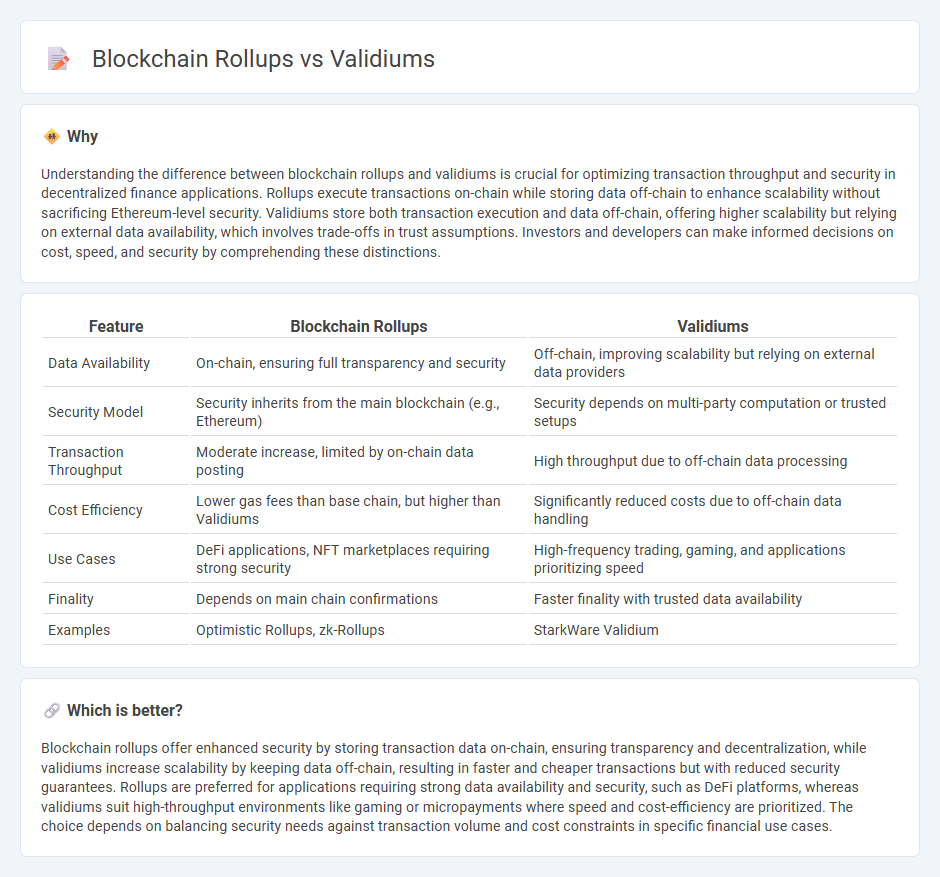
Blockchain rollups and validiums both enhance Ethereum scalability by processing transactions off-chain while maintaining security. Rollups post transaction data on-chain for increased transparency, whereas validiums keep data off-chain, offering higher throughput with reduced on-chain data availability. Explore these solutions to understand their impact on decentralized finance and network efficiency.
Why it is important
Understanding the difference between blockchain rollups and validiums is crucial for optimizing transaction throughput and security in decentralized finance applications. Rollups execute transactions on-chain while storing data off-chain to enhance scalability without sacrificing Ethereum-level security. Validiums store both transaction execution and data off-chain, offering higher scalability but relying on external data availability, which involves trade-offs in trust assumptions. Investors and developers can make informed decisions on cost, speed, and security by comprehending these distinctions.
Comparison Table
| Feature | Blockchain Rollups | Validiums |
|---|---|---|
| Data Availability | On-chain, ensuring full transparency and security | Off-chain, improving scalability but relying on external data providers |
| Security Model | Security inherits from the main blockchain (e.g., Ethereum) | Security depends on multi-party computation or trusted setups |
| Transaction Throughput | Moderate increase, limited by on-chain data posting | High throughput due to off-chain data processing |
| Cost Efficiency | Lower gas fees than base chain, but higher than Validiums | Significantly reduced costs due to off-chain data handling |
| Use Cases | DeFi applications, NFT marketplaces requiring strong security | High-frequency trading, gaming, and applications prioritizing speed |
| Finality | Depends on main chain confirmations | Faster finality with trusted data availability |
| Examples | Optimistic Rollups, zk-Rollups | StarkWare Validium |
Which is better?
Blockchain rollups offer enhanced security by storing transaction data on-chain, ensuring transparency and decentralization, while validiums increase scalability by keeping data off-chain, resulting in faster and cheaper transactions but with reduced security guarantees. Rollups are preferred for applications requiring strong data availability and security, such as DeFi platforms, whereas validiums suit high-throughput environments like gaming or micropayments where speed and cost-efficiency are prioritized. The choice depends on balancing security needs against transaction volume and cost constraints in specific financial use cases.
Connection
Blockchain rollups and validiums enhance scalability by processing transactions off-chain while maintaining security through cryptographic proofs. Rollups store transaction data on-chain for increased transparency, whereas validiums keep data off-chain to improve speed and reduce costs. Both technologies leverage zero-knowledge proofs to ensure data validity and integrity within decentralized finance applications.
Key Terms
Data Availability
Validiums enhance scalability by storing transaction data off-chain while maintaining on-chain validity proofs, significantly reducing on-chain data load and improving throughput. Blockchain rollups, specifically optimistic and ZK rollups, keep transaction data on-chain, ensuring maximal data availability and security but with increased on-chain storage requirements. Explore deeper insights on how data availability models impact scalability and security in blockchain rollups and validiums.
Security Model
Validiums offer enhanced scalability by storing data off-chain while maintaining transaction proofs on-chain, reducing on-chain data load and increasing throughput. In contrast, blockchain rollups keep both transaction data and proofs on-chain, providing stronger security guarantees through increased data availability and resistance to data withholding attacks. Explore more to understand which security model aligns best with your decentralized application needs.
Scalability
Validiums enhance scalability by processing transactions off-chain while storing data externally, significantly reducing on-chain congestion compared to traditional blockchain rollups that manage both transaction validity and data availability on-chain. Blockchain rollups, including Optimistic and ZK rollups, maintain higher security through on-chain data availability but face limitations in throughput and latency due to on-chain data constraints. Explore further to understand how these solutions balance scalability, security, and data availability for optimal blockchain performance.
Source and External Links
What Are Validiums and How Do They Work? - Validiums are Ethereum scaling solutions that process transactions off-chain using zk-proofs, storing only state roots with proofs on-chain to improve efficiency and scalability while maintaining security.
Validium - Validiums use zero-knowledge validity proofs like zk-rollups but keep transaction data off-chain, allowing them to process thousands of transactions per second with trade-offs in data availability and potential fund access risks.
All About Validiums: Principles Of Operation, Pros And Cons - Validiums solve Ethereum scalability by using off-chain zk-proof validated transactions, and come in varieties such as standard validiums, volitions, and bonded validiums, each with different balances of cost, security, and scalability.
 dowidth.com
dowidth.com